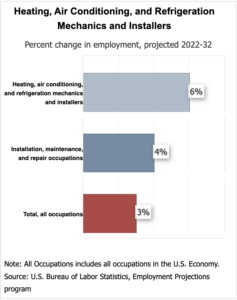HVAC Career Guide – Projected Growth & Salaries
In the modern world, we take climate control for granted. We have become accustomed to staying warm indoors without having to pile on hats, coats, socks, and other clothes; we turn to fans and air conditioners to build a cool summer climate. Data centers rely on a carefully controlled temperature to keep our information safe and always available. Hospitals rely on climate control to keep patients comfortable and strategically designed airflow to keep patients healthy. In addition, the proper disposal, purification, and reuse of refrigeration chemicals at the end of a cooling appliance’s life is an essential part of the solution to the climate crisis.
Heating, air conditioning, and ventilation (HVAC) systems make much in our society possible, and HVAC technicians are the professionals that put those systems in and keep them running. With growing populations, warming temperatures, increased reliance on data, and a need to be mindful of how our appliances affect our earth, the field for careers in the HVAC field are growing.
The U.S Bureau of Labor Statistics (BLS 2024) projects that openings for HVAC technicians will grow 6 percent nationally between 2022 and 2032, which is just slightly slower than the average for all occupations (3 percent). This growth is due to a bustling construction industry that requires the skills of HVAC technicians and contractors in building new homes.
Furthermore, homes built between 2006 and 2010 will need their HVAC systems replaced since most systems last 10 to 15 years. A modern emphasis on pollution reduction will likely lead to the retrofitting of equipment and systems so that they are energy efficient and no longer use prohibited refrigerants.
New regulations require homes to be more energy-efficient than in the past, and those in HVAC careers need to have more technical skills to understand these new systems. For example, some homeowners now opt for two-stage furnace systems that create more balanced heating and lead to improved energy efficiency. Homeowners may also be more interested in savings and invest in better equipment upfront to be able to save on costs in the future.
HVAC technicians install, care for, repair, and help with the proper disposal of heating and air-conditioning systems units. HVAC technicians also work with ventilation and refrigeration systems in residential and commercial properties.
On a day-to-day basis, HVAC technicians may find themselves responding to customer service requests, traveling to job sites, educating customers on energy savings and best use, and performing repairs or maintenance according to need or pre-set schedules.
HVAC techs are responsible for ensuring that HVAC systems are running according to performance standards and as per local, state-wide, and federal regulations. Because of the physical nature of the work, HVAC techs must be able to lift certain amounts of weight, bend and stoop, and have a baseline amount of physical endurance.
HVAC Technician Salary & Career Outlook

As noted above, predictions stemming from 2023 data show that jobs for HVAC mechanics and installers are expected to grow by 6 percent through the year 2032, which is just slightly higher than the average for all U.S. professions (3 percent). This equates to 37,700 new jobs over that decade-long span.
According to PayScale (2024), HVAC technicians looking for entry-level HVAC jobs can expect to begin their careers making anywhere from $26,000 annually to $66,000. The average wage for HVAC entry-level jobs is $39,9773 ($19.22 per hour). Those looking to make more than the average should cultivate skills in HVAC system design and/or skills in the commercial arena.
Of course, salary expectations vary by source of information. In the U.S., the most comprehensive and reliable source of pay data is the Bureau of Labor Statistics. The BLS (May 2023) reported that there were 397,450 HVAC mechanics and installers nationwide, earning an average annual salary of $59,620. Here are the percentile wage estimates for HVAC technicians:
| United States | |
|---|---|
| Number of HVAC Professionals Employed | 397,450 |
| Annual Mean Wage | $59,620 |
| 10th percentile | $37,270 |
| 25th percentile | $46,550 |
| 50th percentile | $57,300 |
| 75th percentile | $71,120 |
| 90th percentile | $84,250 |
The region in which an HVAC technician is employed can also have a major impact on how many jobs are available. According to the BLS (May 2023), the following states in the U.S. employ the greatest number of HVAC techs:
| State | Number of HVAC techs |
|---|---|
| Florida | 37,370 |
| California | 35,630 |
| Texas | 31,910 |
| New York | 22,700 |
| Pennsylvania | 18,980 |
The region also has an impact on the average HVAC technician’s salary. According to the BLS (May 2023), the following five states in the US boast the highest average salaries for HVAC technicians:
| State | Annual mean wage |
|---|---|
| District of Columbia | $77,970 |
| Alaska | $75,660 |
| Massachusetts | $75,190 |
| Hawaii | $74,200 |
| Washington | $72,340 |
Despite these regional differences in HVAC technician salaries, it should be noted that the cost of living may make higher salaries necessary, or lower salaries sufficient, for the cost of living. For example, according to the Missouri Economic Research and Information Center (MERIC 2024), Hawaii is the most unaffordable region in the U.S., and Massachusetts, Alaska, the District of Columbia, and New York are all in the top ten most expensive regions in the country. The high cost of living in each of these areas could be one reason to explain why they need to offer the highest average salaries to HVAC technicians.
For those interested in pursuing a career in HVAC repair, maintenance, or installation, there is a wide range of careers available. Keep reading to learn more about basic ways to enter an HVAC career, in addition to what careers are available.
HVAC Career Details
Although education beyond high school is not technically required for an HVAC career, the BLS (2023) notes that the increasing complexity of HVAC systems means that most employers prefer that HVAC technicians have some form of postsecondary training.
Students can build HVAC careers by graduating from certificates, diplomas, or vocational programs, which are often the fastest track to work. Those looking to gain a wider breadth of training before work, or those interested in eventual project management should consider earning an associate of applied science (AAS) or a bachelor of science in HVAC. Apprenticeships under a licensed HVAC professional, which last anywhere from two to six years, allow for future HVAC techs to learn skills on the job under an experienced HVAC professional.
It’s important to note that most post-secondary programs will prepare students to pass the EPA section 608 Technician Certification. EPA 608 is a federally-required certification for anyone who will be working with equipment that could release ozone-depleting refrigerants into the atmosphere and is often required, even for entry-level HVAC jobs. There are varied other credentials that HVAC professionals can pursue, detailed at length on the HVAC certification page.
Discover various high-growth HVAC career paths below, including information on accredited training programs, salary, career outlook, and licensing.
AC Technician
With increasingly extreme weather throughout the year, the demand for climate control experts such as AC technicians is unlikely to dwindle. Rather, the demand for those technicians who are well-versed in new air conditioning systems, particularly those with more complex computer control systems, will only increase.
Automotive HVAC Technician
Today, even the least-expensive vehicles come with climate control as standard equipment. An automotive HVAC tech keeps all the parts working smoothly and efficiently to maintain interior comfort for passengers.
HVAC Engineer
HVAC engineers plan and coordinate every aspect of a system installation. HVAC engineers can conduct performance evaluations of existing systems, recommend improvements to increase efficiency, and design climate control systems for new construction.
HVAC Installer
HVAC installation is the process of putting heating, ventilation, and air conditioning systems into residential and commercial properties. HVAC installers need to have mechanical skills and be manually dexterous to put these systems into place. They should be physically strong, capable of troubleshooting, and know how to manage their time since they may have more than one site where they work.
HVAC Mechanic
For anyone who believes they have what it takes to become an HVAC mechanic, now could be a good time to explore the career. The BLS has indicated that the career opportunities for HVAC mechanics are expected to climb over the next decade, at a rate of 6 percent from 2022 to 2032 (BLS 2024).
HVAC Refrigeration Technician
A refrigeration technician cares for the refrigeration and cooling systems in a home or place of business, such as a restaurant kitchen, grocery store, or a home that is under construction. They know how to install and repair these systems and may be tasked with doing upgrades, replacing parts, or working with new units. Refrigeration technicians are usually familiar with many different kinds of systems and know how to read schematics.
Solar Technician
Thanks to the solar power market's rapid growth, the United States Bureau of Labor Statistics has noted a positive job outlook for solar PV installers. It predicts that employment will increase by an astounding 48 percent between 2023 and 2033 and that the industry will open up excellent job opportunities for qualified individuals—particularly those who complete photovoltaic training programs.
Wind Turbine Technician
As the demand for renewable and green energy continues to escalate, the number of wind turbines and wind farms will increase. In fact, CareerOneStop reports that wind turbine service technicians are the fastest growing occupation in the United States.









